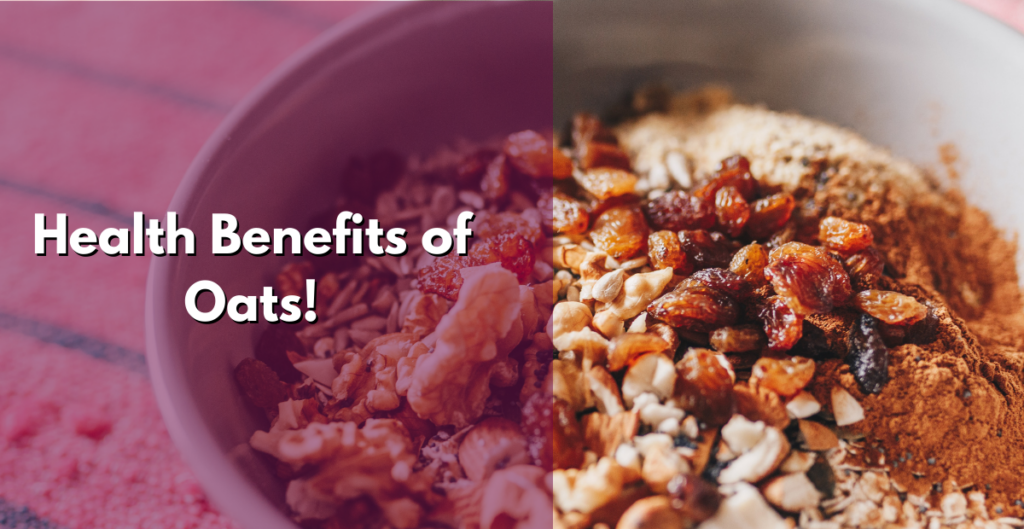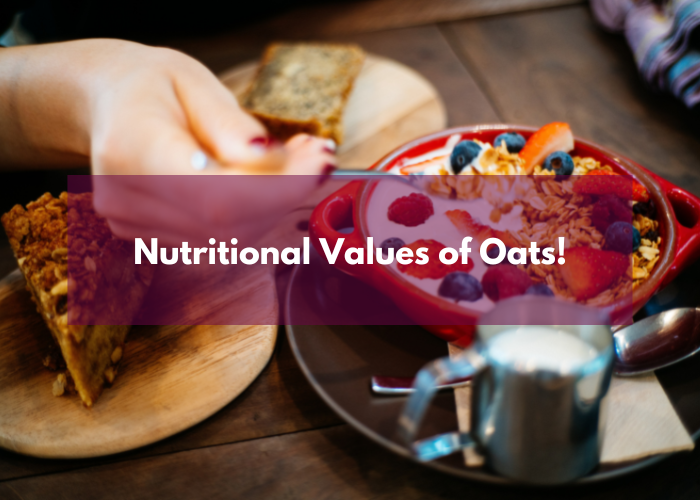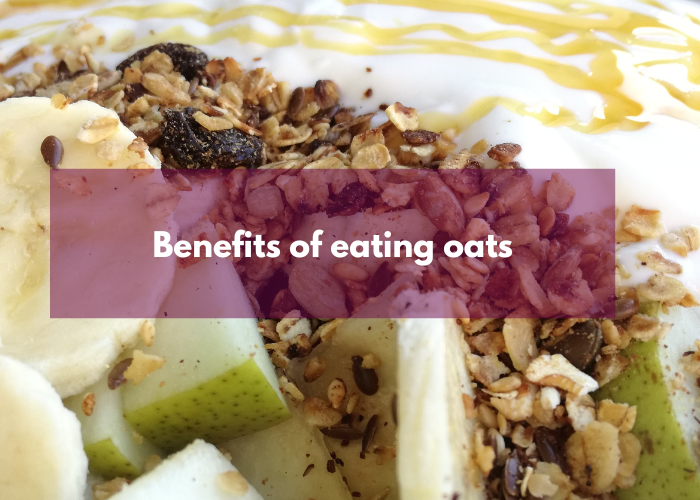Oats are one of the best grains to choose from for foods that are great for health. If you have not trusted the magical grains, read the health benefits of oats mentioned in the following article.
I am sure you will start loving oats soon!
These days people are inclined toward their health consciously. Especially after the pandemic breakout, many people have recently started taking care of their diets and health. They are more about incorporating healthy habits into their daily lives.
Certainly, when there is a health talk, oats automatically come in. This is because these magical grains are so powerfully packed with awesome qualities that no one can deny having them.
So, let’s explore more about oats.
The Health Benefits of Oats:

Of course, you want to know what are the health benefits of eating oats, but, first of all, let’s know what oats are and their types:
Oats are the whole grain food that is the most preferred breakfast these days. However, you can take them anytime.
These are essentially gluten-free whole grains, which are quite healthy to consume. Oats can be combined with a variety of freshly cut fruits, milk, and even vegetables to form a filling meal suitable for breakfast, lunch, or dinner at any time of the day!
Types of Oats you will find in the market:
These days there are many different popular kinds of this wonderful grain available in the market today. The processing that changes the taste, texture, and cooking time of oats makes them different from one another.
Popular varieties of oats include:
Instant Oats:
Instant oats, also referred to as fast oats or quick oats, cook quickly and well. Precooked, dried, rolled, and pressed oats to make these thin flakes. You only need to add a few items to be ready to go!
These are the most famous type of oats. And the reason is the quick time to prepare!
Rolled Oats:
Rolled oats are a traditional form of old-fashioned oats. However, these are processed similarly to instant oats. They are pressed and steam-boiled but not already cooked. They often have a thicker texture and require more time to cook.
Steel-cut oats:
The oat groat is divided into tiny pieces to produce steel-cut oats. The texture of these oats is chewy. As they are neither cooked nor steamed, even not flattened, they cook more slowly than other foods.
What are the health benefits of steel-cut oats?
These uncooked forms of oats are magnificently healthy.
Check out their benefits:
- It prevents the risk of heart disease.
- Controls blood pressure.
- It keeps you full for a longer period.
- Steel-cut oats are the best on your weight loss journey.
- Helps in managing diabetes.
- Being highly rich in fiber, it relieves constipation.
Nutritional Values of Oats:

Oats have high nutritional values.
Roughly per 100 gms serving of oats contains:
- Calories: 307 grams
- Fat: 7 grams
- Dietary Fibre:11 grams
- Water: 8.7 grams
- Protein: 17 grams
- Carbs: 65 grams
- Sugar: 0.8 grams
- Cholesterol: 0
- Sodium: 2 mg
- Vitamin B6: 5%
- Calcium: 5%
- Potassium: 425 mg
- Whole grains include manganese, which is great for metabolism.
- Phosphorus: Bone health depends on this mineral.
- Antioxidant copper is crucial for heart health.
- Thiamine is another name for vitamin B1.
- Iron: A protein that carries oxygen through the blood.
- Selenium: Vital for immunity and brain health.
If you have gone through the list, you must know why oats are trending in the healthy meal list!
Benefits of eating oats:

Finally, we reached the main point of the article.
Below are some health benefits of eating oats. A must-check!
1. Best for Digestion:
Because of their high fiber content, oats are excellent for digestion. Therefore, your bowel motions are typically controlled by fibers, which keep your digestive system functioning properly.
Not only digestion but also other stomach-related issues can be checked through oats.
Numerous issues, including gas, indigestion, constipation, diarrhea, and even irritable bowel syndrome, can be avoided with the help of oats. Therefore, a bowl of oats should help if you are experiencing any stomach problems.
It is interesting to know that in contrast to pulses and beans, which typically take 120 minutes to digest, oats take about 90 minutes.
2. Aids in weight loss:
If you struggle to shed some extra pounds, include oats in your daily routine.
Oats assist with weight loss in a variety of ways. First, because they are rich in fiber, they provide satiety and lessen the urge for food.
Further, Oats are a great food for reducing weight because they are low in calories and fat.
You can use oat to make nutritious meals by including fresh fruit and ensuring that your body maintains its health while being full.
3. Controls cholesterol, blood pressure, and diabetes:
Oats can help you lower your bad cholesterol and ward off heart issues. Oats lower cholesterol levels. Bad cholesterol (LDL) levels that are too high can cause several cardiac issues, such as blocked arteries, cardiovascular disease, heart attacks, and strokes.
Further, you can lower your blood pressure with its assistance.
Try oats to control Blood sugar levels as these can be decreased with oats to prevent diabetes. Because oats are complex carbs, the digestion of sugar in your body may be slowed down.
The miracle grain’s low glycemic index can help lessen insulin injections’ dependence.
Overall, oats can work as a single medicine to combat many diseases.
4. Best for glowing skin:

Blessed with amazing anti-inflammatory and antioxidant characteristics, this magical grain can work wonders for your skin.
Oats include saponins, a naturally occurring substance that functions as a natural cleaner. So add this adaptable grain, oats, to your skincare routine for healthy, radiant skin.
They can treat acne by absorbing extra oil from your skin.
5. Aids in Cancer treatment:
One reason for Oats’ popularity is that they are thought to prevent cancer. Oats help the body rid itself of free radicals. A build-up of free radicals in the body can result in several cancer types.
Enterolactone, lignin with several phytochemicals, is a component of oats. Antioxidants are characteristics of phytochemicals that work wonders in treating cancer-like fatal diseases.
Consequently, a bowl of oats can greatly safeguard your body from cancer.
6. Excellent source of protein: A blessing for bodybuilders!
One of the most vital nutrients that our body requires is protein. They are known as the body’s building blocks because they support several processes that promote growth and development. t
And proteins are abundant in oats.
Oats can be a part of a bodybuilding diet because of their rich protein content. Following an exercise, eat some oatmeal to help your body repair damaged cells, develop new ones, and maintain general health.
7. Decrease the risk of asthma in children:
The most prevalent chronic illness among children is asthma. Increasing pollution is highly dangerous for kids as it can cause asthma.
Of course, we cannot control the pollution level on our own completely. But, including oats giving infants oats before they turn 6 months old is linked to a lower chance of developing asthma in childhood.
8. Regulates energy levels during pregnancy:
Healthy carbohydrates in oats give high energy during pregnancy to would-be moms. As we know, energy levels fluctuate during those pregnancy months, and including oats in the diet could be an excellent decision for both mom and baby.
9. Best as immunity boosters:
Your immune system is your body’s main line of defense against illnesses and infections brought on by bacteria, viruses, germs, and fungi. Therefore, maintaining a healthy immune system is essential.
Oats contain a lot of beta-glucan. The health of the neutrophils depends on these nutrients.
Oats work well as immunity boosters. Oats increase immunity. They make the system stronger as a whole and aid your body in fighting off illnesses and infections, keeping you safe and secure.
10. Best cereal for babies:
Oats are unquestionably a great meal option for babies who have just started taking solids to toddlers. Oats are nutrient-dense and abundant in the important nutrients needed for a baby’s growth.
For babies, steel-cut oats work the best. You can prepare different recipes by using oats and milk.
Hopefully, you are convinced by the excellent benefits of oats for your health.
Conclusion
The benefits mentioned above are not the whole story. The health benefits of oats are more than you imagine.
However, these ten benefits convince you to have oats in your daily routine.
Many celebrities eat oats and oatmeal in their breakfast to kick start their day.
“I live a pretty domestic and normal life. I make my kids breakfast most mornings, but nothing too elaborate – soft-boiled eggs and oatmeal. Pierce Brosnan”